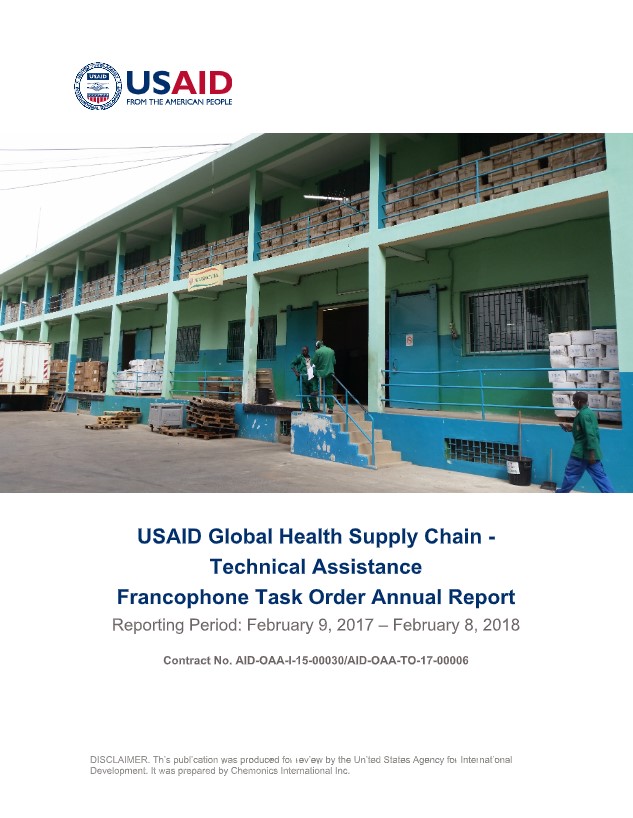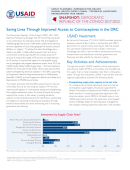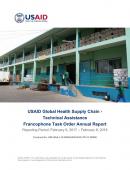The USAID Global Health Supply Chain (GHSC) – Technical Assistance (TA) Francophone Task Order (FTO), a five-year project awarded to Chemonics International on February 9, 2017, provides specialized supply chain expertise to Benin, the Democratic Republic of the Congo (DRC), Haiti, Senegal and select francophone countries of West Africa (Burkina Faso, Niger, Mauritania and Togo). The project works across all health elements, contributing to the goals of USG initiatives such as PEPFAR, PMI and FP2020. Building on the results of the USAID-funded Systems for Improved Access to Pharmaceuticals and Services (SIAPS) and USAID | DELIVER projects, GHSC-TA Francophone TO closely collaborates with IntraHealth International (IntraHealth), McKinsey & Company (McKinsey), and University Research Co., LLC (URC) working toward its goal to “Strengthen Supply Chain Systems in Francophone Countries of Africa and Haiti to Ensure Timely Access to Quality Essential Health Products and Services, Improve In-Country and Regional Collaboration and Coordination, and Support the Global Health Security Agenda”. This goal is achieved through the following three objectives:
- Objective 1. Strengthen In-Country Supply Chain Systems, including governance, coordination, strategic planning, quantification and forecasting, procurement, logistics and warehousing, logistics management information systems (LMIS), data visibility and monitoring, and capacity building. This applies to all levels of the countries supply chain, including last mile when required. Biomedical and medical equipment maintenance and pharmaceutical waste management are also supported in selected countries. Technical support provided to the main target countries falls under this objective.
- Objective 2. Strengthen Collaboration and Regional Organizations to Improve Commodity Security. The project builds on the accomplishments of other USG supported programs, such as USAID | DELIVER and SIAPS, to empower regional actors to strengthen health systems, and to foster the collaboration and coordination between all relevant regional (e.g. the Ouagadougou Partnership) and global (e.g. 90/90/90) initiatives. The supply chain for family planning and reproductive health has been identified as the priority area. The project provides guidance to select countries of the West Africa Regional Office (Burkina Faso, Mauritania, Niger, and Togo) in the implementation of technical activities such as in-country logistics, quantification, and supply chain optimization, as well as enhancing data sharing and visibility.
- Objective 3. Support the Global Health Security Agenda (GHSA) and Supply Chain Emergency Preparedness Strategies by developing an essential competencies framework for supply chain management to respond to public health emergencies efficiently, customizing this framework for a specific country (Cameroon was selected for a pilot) and testing it at the country level. The project engages all relevant stakeholders to ensure that the adequate resources are available, and responsibilities clearly defined to ensure that country supply chains are fully equipped to respond in the most efficient fashion to public health emergencies.
To reach these objectives and to achieve its ultimate goal, the project prioritizes specific activities in each focus country, based on the actual gaps and needs of the countries and designed in consultation with the national governments and USAID missions.
In Benin, the project supports the Ministry of Health and the Centrale d’Achat des Médicaments Essentiels (CAME), a government agency responsible for central procurement of essential medicines, providing guidance on how to improve policy, governance, strategy, and coordination among different stakeholders. In FY 18, the project supported CAME’s regional offices and zonal depots of the health system in strengthening pharmacists’ and healthcare workers’ capacity in stock management and accurate quantification. Additionally, the project provided technical assistance to Benin in the area of pharmaceutical waste management, which was identified as a priority for the first year of the project.
In the first year of its operation in the DRC, the project provided supply chain services, building on the activities of the USAID-funded SIAPS, Supply Chain Management System (SCMS) and USAID|DELIVER projects, thus ensuring uninterrupted availability of malaria, family planning and tuberculosis commodities, and essential medicines at USAID-supported sites. The DRC team closely collaborates with the Integrated Health Project (IHP+), ensuring effective coordination of USG-supported efforts. The project’s activities in the DRC focus on the improvement of the in-country supply chain logistics, capacity building of staff, securing storage of commodities, management and distribution at regional distribution centers; and data collection optimization and coordination. The project also provides support to the DRC’s medicines registration authority to improve its registration process to secure the availability of needed products on the market.
In Haiti, the project focuses on the design of a national pharmaceutical waste management system and the improvement of the laboratory and medical equipment maintenance, including capacity training in these areas. In Senegal, the project’s efforts are directed toward improving data availability at the national and local levels to reliably estimate commodity needs, develop appropriate supply plans, and identify trends and determinants of the variance between projected and actual commodities use. The project plays a key role in coordinating the procurement of health commodities through the GHSC-Procurement and Supply Management (PSM) project and expediting customs clearance processes for the USG - procured products.
In June 2018, the project completed its activities in support to GHSA, including the development of an Essential Competencies Framework for Supply Chain Management to provide an effective and efficient response to public health emergencies. The Framework includes the Emergency Supply Chain Playbook that consists of a set of tools, guides, standard operating procedures, and protocols to help countries prepare and respond to epidemic and pandemic health emergencies. The project has successfully piloted the Playbook in Cameroon, where it has been customized for the country’s context, has been adopted, and is now being incorporated into the national emergency preparedness and response strategy. The Framework is now available to the GHSA member nations, and several countries, including Kenya, have already expressed interest in its customization to their context. (See under “Resources”)


